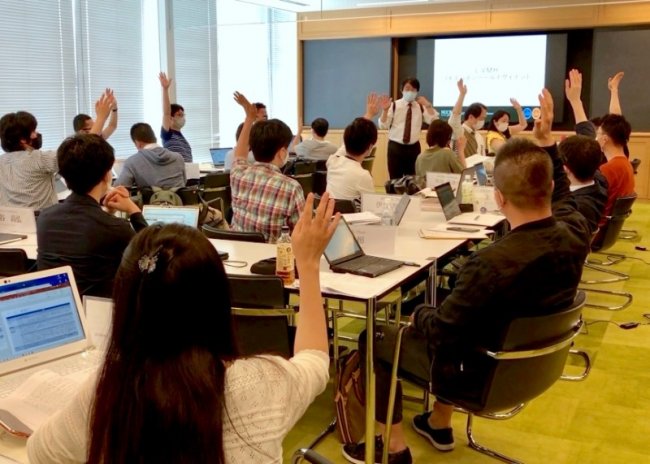The fall semester began on Saturday, September 26, 2020, and we were able to resume face-to-face classes with the cooperation of many people involved, including faculty, staff, and students. At the Osaka Campus, while observing ventilation and social distance and taking thorough measures against viral infections, "Business Analysis" by Professor Yuko Haga was started.
With the rapid pace of change in the environment, decision making requires analysis from a variety of angles. In this class, students will examine strategic decisions made by companies as the decision makers. Using cases such as alliances, acquisitions, diversification, and business innovation of large companies, students will conduct the necessary analysis for the case situation, including industry analysis, analysis of the company's own management resources, and competitive analysis, and consider and discuss what action they would take if they were the manager. Students will understand the theory and framework of business strategy and develop the ability to analyze the necessary information more logically and deeply.
The first day of class started with an industry analysis using the cases of Amazon and Wal-Mart. Wal-Mart had been the top retailer in the U.S., but the company's strength, "Everyday Low Price," was not resonating with customers as much as it used to. McMillon, the CEO of Wal-Mart, continued to strengthen the e-commerce business and implement various measures, but the company could not continue to grow as it had in the past. Amazon, on the other hand, continues to expand its e-commerce business with original and innovative ideas, becoming the top e-commerce retailer in the United States in 2014, and surpassing Wal-Mart in terms of market capitalization in 2015. The discussion was based on the students' own experiences: what is Amazon's vision, how did it respond to the changes in the internal and external environment, and what decisions should be made based on the analysis of the competitive situation of the two companies, which have their own success stories as retailers. The discussion was based on the students' own experiences. Afterwards, Prof. Haga further questioned the opinions of the students from different perspectives, and by analyzing and predicting the future competition of these companies, the students were able to understand the process of considering strategies.

 Brochure
Brochure
 Info Session
Info Session
 Application
Application
 Alumni Voices
Alumni Voices












